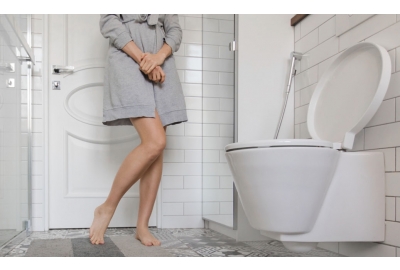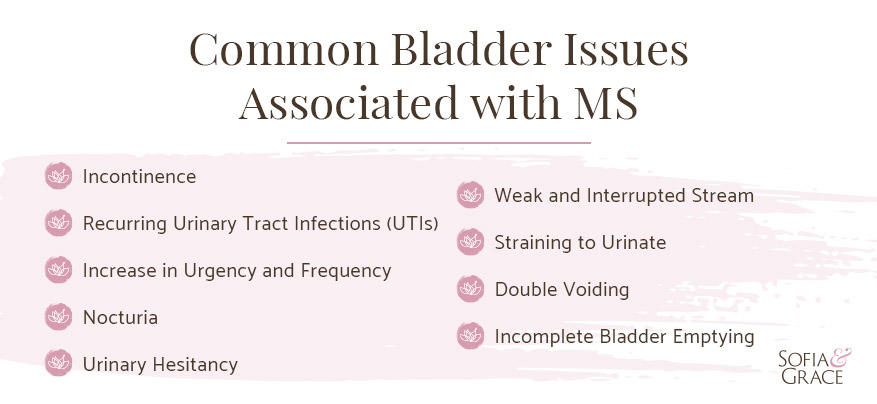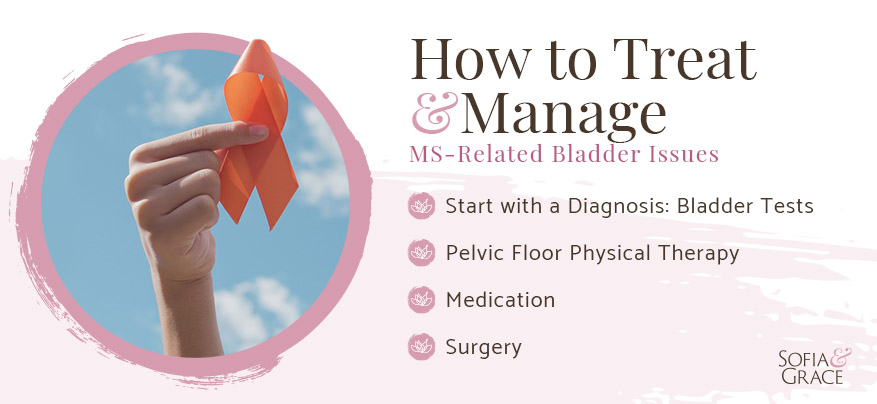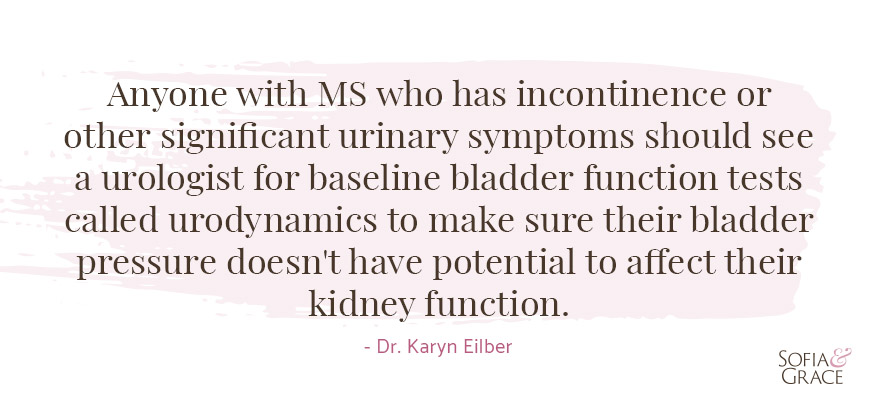
MS Bladder Issues: How Multiple Sclerosis Affects Your Bladder
If you or someone you love suffers from multiple sclerosis (MS), you already know there’s a long list of challenging side effects that comes with the condition. When you have MS, your body’s immune system eats away at the protective coating surrounding the nerves, which disrupts their ability to communicate with your brain. This leads to pain, numbness, weakness, tremors, fatigue, dizziness, slurred speech, and more frustrating side effects.

The Most Common Bladder Issues from MS
Although it affects around 80 percent of people with MS, bladder dysfunction is still one of the lesser-known complications — and the lesser-treated — of multiple sclerosis. With MS comes a slew of bladder-related issues, including incontinence (loss of bladder control) as well as recurring urinary tract infections, nocturia, and an increase in urgency and frequency. These issues are not to be taken lightly, as they can cause urine backup and lead to serious kidney damage.
“Symptoms of MS-related bladder dysfunction include urinary urgency, increased daytime frequency, nocturia (nighttime frequency), and incontinence,” said health and wellness writer Dr. Rashmi Byakodi. Dr. Byakodi also noted that MS patients often experience symptoms such as urinary hesitancy, weak and interrupted stream, straining to urinate, double voiding, and a sensation of incomplete bladder emptying after voiding.

What Is Nocturia? Visit Our Blog to Find Out.
Why Multiple Sclerosis Causes Bladder Issues
So why, specifically, does the condition affect the bladder? For the answer, we turned to Dr. Karyn Eilber, CEO and Co-Founder of GLISSANT and Associate Professor of Urology and Obstetrics and Gynecology at Cedars-Sinai Medical Center.

“Bladder function is mainly reflexive, and since MS is a disease of the nerves, the normal reflexes can be negatively affected,” she said. “MS commonly causes dyssynergia [a lack of coordination in the muscles] in women — meaning the bladder and the urethra are not working in sync. Instead of the urethra opening during urination, it stays closed so the urine cannot come out completely.”
The bladder is like any organ in that it needs nerve input to function properly. Unfortunately, people with multiple sclerosis do not have normal nerve input, which causes muscle spasms which generate feelings of pressure in the bladder and can lead to kidney damage.
Is It MS or Something Else?
According to Dr. Eilber, there are a few simple ways to determine if your bladder issues are linked to MS or another trigger, such as aging or childbirth.
“Vaginal birth, major pelvic surgery, or other medical conditions can often cause incontinence, but they don't usually cause dyssynergia,” she said. Additionally, your medical history will provide clues into your diagnosis. “I have had many patients with MS and incontinence, and the incontinence was due to vaginal birth. For instance, a woman who has had stable MS symptoms for years who starts leaking with coughing and sneezing after childbirth almost certainly has leaking due to delivery and not MS.”

How to Treat and Manage MS-Related Bladder Issues
The best thing you can do to manage your multiple sclerosis related bladder issues is to seek out professional treatment. Coupled with high-quality incontinence products for women, professional medical care will help you manage symptoms on a day-to-day basis so you can lead a normal life.
- Start with a Diagnosis: Bladder Tests — Those with multiple sclerosis who have experienced bladder issues should see a urologist for baseline bladder function tests called urodynamics. These tests help ensure that the excessive bladder pressure doesn't affect their kidney function or any other function.

- Pelvic Floor Physical Therapy — Pelvic floor physical therapy, used at home with Kegel balls and in clinical settings with the guidance of a professional, can help people with multiple sclerosis retrain their pelvic floor muscles for better control. Studies show that women with MS who underwent 12-week pelvic floor training programs experienced fewer storage and voiding symptoms. Professional therapy can be paired with bladder training treatments for even better results.
- Medication — If therapeutic interventions don’t work, your doctor may prescribe medications to help you control your bladder. Some of the more common options involve muscle-control medications, such as darifenacin, fesoterodine, imipramine, oxybutynin, solifenacin, tolterodine, trospium, and prazosin. Many of these medications fall into the class of anticholinergic drugs, which block involuntary muscle movements and can therefore help treat storage issues related to MS.
- Surgery — Although rare, there are situations where medications and therapy do not help patients who experience MS-related bladder dysfunction. In that case, a surgery called suprapubic cystostomy may be recommended. With this surgery, a tube is inserted into the bladder via the lower abdomen, allowing the urine to drain into an external bag. Other surgeries involve inserting an electrical stimulation device that helps the bladder properly store and eliminate urine.
Life with MS is challenging, but knowing how to deal with common complications such as bladder dysfunction can help those with the condition live a long, happy life in spite of it.
Shop All Incontinence Products
Image Sources
SewCream / Shutterstock.com
Pravokrugulnik / Shutterstock.com
Alex Millauer / Shutterstock.com
G.Tbov / Shutterstock.com